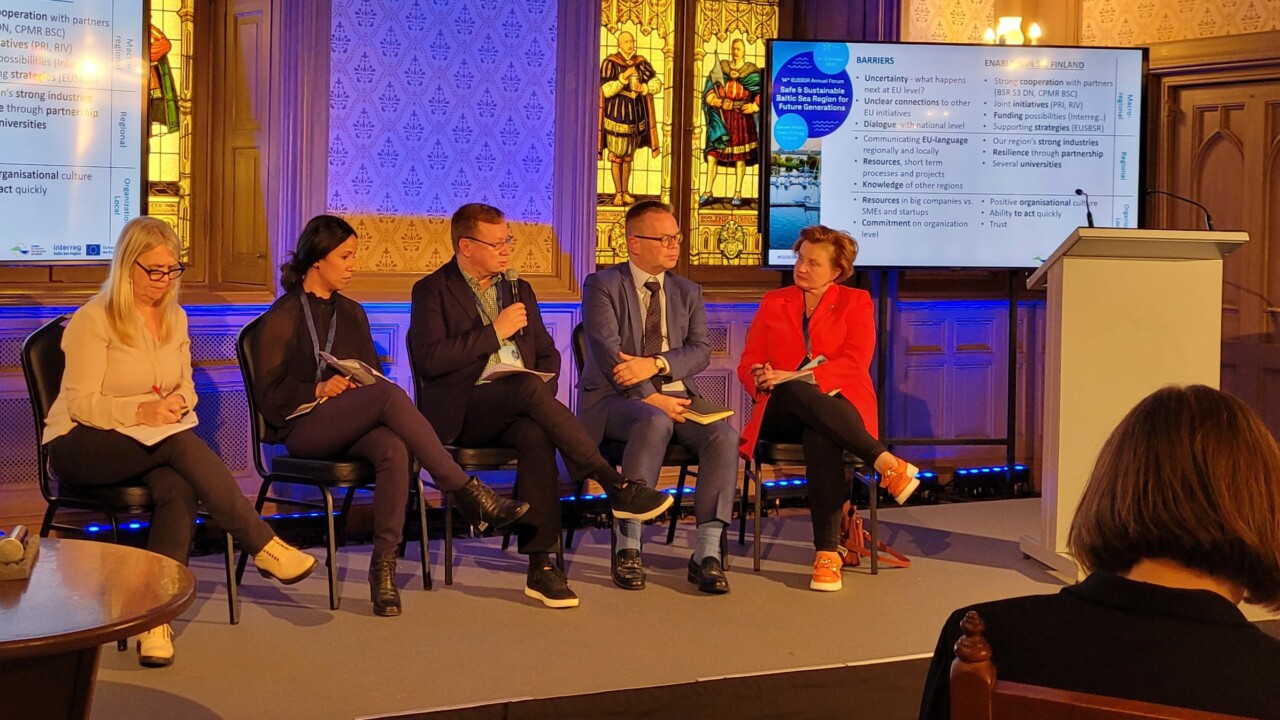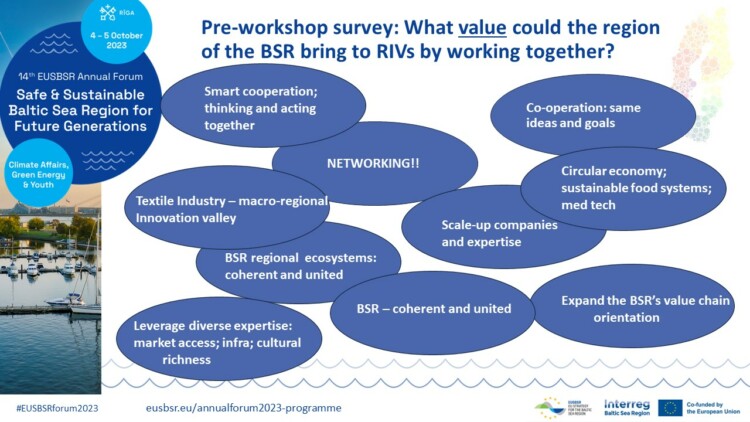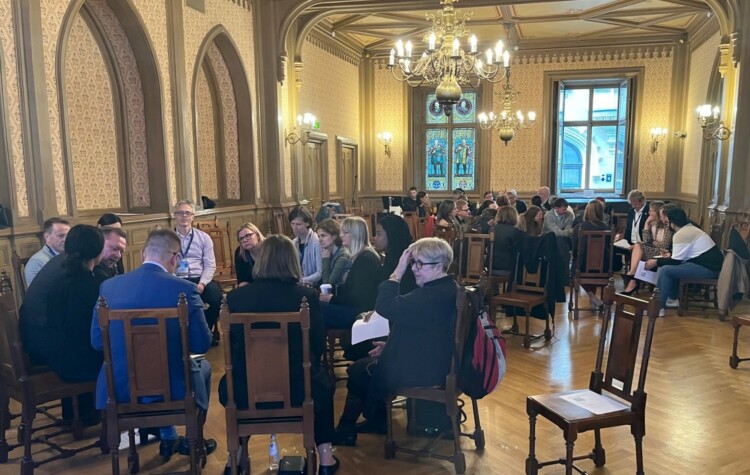Co-creating a macro-regional innovation valley

The collaborative innovation capacity across the Baltic Sea Region is unique. Many actors within the region are active in their innovation efforts and want to be part of solving the burning challenges the EU and the BSR are facing today. Support is still needed, and the regions need to better articulate demand for innovation collaboration.
“Co-creating the vision and foundations of a BSR innovation valley” workshop explored the appetite across Baltic Sea Region innovation actors for the macro-region to act as a front-runner in adopting a macro-regional approach to the new Regional Innovation Valley concept, which is based on the New European Innovation Agenda flagship of accelerating European Innovation Ecosystems. The workshop was organized as part of the European Union Strategy for the Baltic Region Annual Forum in Riga, in October 2023.
Articulating demand for innovation collaboration
This highly interactive discussion session provided an excellent opportunity to test reactions and ideas about if and how the EU’s new Regional Innovation Valleys (RIVs) concept had relevance and added value to the regions of the Baltic Sea – individually and collectively. The below offers a flavor of the responses to this theme and – together with pre and during workshop on-line survey results – fresh insights into general appetite across our macro-region to explore further our collective potential for RIVs were gathered.

Overall, it is clear that there is significant curiosity for this topic that is not very well-known or understood across regional innovation actors and ecosystems of the Baltic Sea. Workshop attendees expressed some concern that EU initiatives are often insufficiently aligned and that this makes ‘keeping track’ rather difficult. For this reason, the EUSBSR – with its long-established history – continues to provide the ideal baseline and ‘go-to’ place to learn about wider and relevant EU initiatives. More can be done to improve communications and connections to broader EU opportunities, not least in a context of global complexity where the EU must be more strategically coordinated. The importance of strenghtening joint (/peer) learning between regions within the BSR was also highlighted by the workshop’s key-note speaker Sari Nurro and panelists Marta Bahta, Petteri Partanen and Petri Koistinen. The innovation ‘space’ is one such area where greater policy alignment is needed.
Workshop attendees also pointed to wider bottlenecks across the BSR – lack of political will, governance, and structured knowledge – that can prevent incentives, and a clear ‘roadmap’ for local action, not least to boost national level appetite for inter-regional innovation collaboration.

Furthermore, ‘competing’ EU funding initiatives can often lead to inertia, where actors often manage their time and efforts by focusing on known routes for financing, rather than trying new and different ideas. Improved strategic alignment – of EU initiatives and related investments – could help regional actors to better navigate the EU funding ‘puzzle’ and could also help regions to adopt a longer-term vision for their joint innovation efforts. Some concern was expressed concerning current incentives to adopt a short-term and repetitive approach to innovation collaboration that prevents a more strategic BSR innovation orientation.
Importantly, the place-based dimension to the BSR was emphasized, not least in working together to support those places and communities that are (or risk being) left behind. Innovation collaboration can be a strong driver to support this.
Way forward
BSR innovation actors can generate new ‘leverage’ in connecting to new (and emerging) innovation tools and platforms by signaling their interest and engagement in Regional Innovation Valleys. RIVs have strong links to instruments such as Interregional Innovation Investments (I3) and Horizon Europe. Together with Interreg projects, there is significant potential to both generate a ‘portfolio’ approach to project engagement and to connect to EU priorities (such as in increasing global food security and reducing the reliance on fossil fuels (hydrogen)).
It is clear that the collaborative innovation capacity across the BSR is unique, yet it remains untapped. We can do more together by better articulating demand for innovation collaboration. The Baltic Sea Region S3 Directors’ Network comprised 10 core regions who aim to do just that. The Network was formed in 2018, under the invitation of Region Västerbotten and seeks to strengthen connected innovation efforts beyond the BSR macro-region, with the aim of joining forces with wider EU structures, networks and initiatives, to boost the EU’s value chain orientation. The organizers of the worshop will take the main findings to the Baltic Sea Region S3 Directors’ Network meeting in November to discuss the next steps.
A warm thank you to all the workshop participants contributing to the discussion!
More information:
The workshop was organised by the Baltic Sea Region S3 Directors’ Network (BSR S3 DN) represented by Region Västerbotten and Regional Council of Southwest Finland, in collaboration with CPMR Baltic Sea Commission and EUSBSR Policy Area Innovation.
For more information about the workshop, the BSR S3 DN and the cooperation, please contact:
- Regional Council of Southwest Finland: Development Manager Salla-Maria Lauttamäki, salla-maria.lauttamaki@varsinais-suomi.fi, +358 40 520 0761
- Region Västerbotten: Coordinator Marta Bahta, marta.bahta@vasterbotten.se, +46 70 616 57 73
In the photo above are (from left to right) the moderator of the workshop Ms Alison Hunter (Economic and Public Policy Consultancy) and the panelists Ms Marta Bahta (Coordinator, Region Västerbotten, Sweden), Mr Petteri Partanen (Business Manager, Regional Council of Southwest Finland), and Mr Petri Koistinen (Policy Coordinator, Unit D1 – Macro-regions, Transnational, Interregional Cooperation, IPA, Enlargement, DG REGIO) and Ms Sari Nurro (Chair of the CPMR BSC Maritime Working Group, Member of the Board of the Regional Council of Oulu Region, Finland).